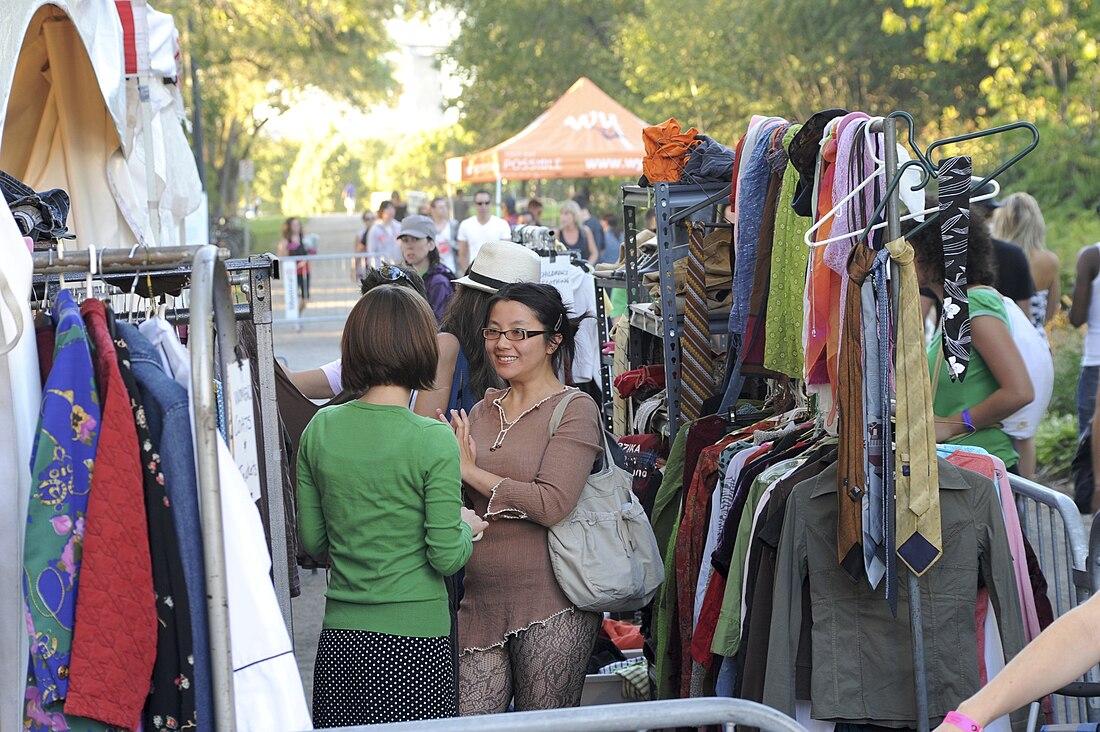Trade
economic branch involving the exchange of goods and services From Wikipedia, the free encyclopedia
To trade is to willingly give things or services and get other things or services in return. For example, a person giving a thing must find another person who wants to get that thing. The giver gets something back in return. A trade is sometimes also called an "exchange" or a "swap".

An early type of trade is barter. Barter was the exchange of goods and services for other goods and services. Barter involves trading things without using of money. Modern traders commonly buy and sell by the use of money. Trade between two traders is called bilateral trade. Trade between more than two traders is called multilateral trade.
Terms
The things that are given from one person to the other are called goods.
Services can also be part of a trade. One person can do a job or work for another, and get something in return in a trade.
Money can be given in return for a service or for a thing. If money is part of the trade, then the person who gives the money is buying, and the person who gets the money is selling.
A place where trading takes place is called a market.
When there is no money involved in the trade, the trade is called barter. If there is money involved in the trade, the trade is called a purchase. In the past, people would barter to get what they wanted, instead of buying goods and services.
Economics includes the study of trade.
Trade occurs not just between people, but also between large companies and even countries. Governments sometimes take some of the money or goods involved in a trade between countries. This is a type of tax called a tariff. Smugglers try to trade without paying tariffs.
Free trade between two countries is when there are small or no tariffs, quotas, or other restrictions on trade. When one country stops all trade with another country, it is called an embargo.
Types of trade
Domestic trade
Domestic trade is the exchange of goods within a country. Domestic trade is very important because it allows different types of goods to reach to all parts of the country. It makes the standard of living of the people of the country better. It helps an industry to grow by making sure that there are raw materials. Domestic trade may be divided into two. They are:
Wholesale
Wholesaling is the sale of goods to industrial, commercial, institutional or other professional businesses. They can also be sold to other wholesalers. It is the sale of goods to anyone that is not a consumer.[1] Wholesalers usually buy and sort goods in large numbers.[2]
Retail
Retail is the process of selling goods or services to consumers through many means of distribution to earn a profit. The term "retailer" usually means where a person sells a small amount of good to many individuals, who are consumers.[3]
International trade
International trade is the exchange of goods and services between different countries. International trade has existed throughout history. Some examples include Uttarapatha, Silk Road, Amber Road, scramble for Africa, Atlantic slave trade, and salt roads. When there is trade between two or more countries, factors like currency, government policies, economy, judicial system, laws, and markets affect trade.[4][5]
International trade may be split up into three different types.
Import
An import is a good or service that was bought in one country but was produced in another country.[6]
Export
An export is a good or service that was produced in one country but was sold to another country.[6]
Entrepôt
An entrepôt is a port, city, or trading post where goods may be imported, stored or sold. These cities grew because of the growth of long-distance trade.[7]
References
Wikiwand - on
Seamless Wikipedia browsing. On steroids.
